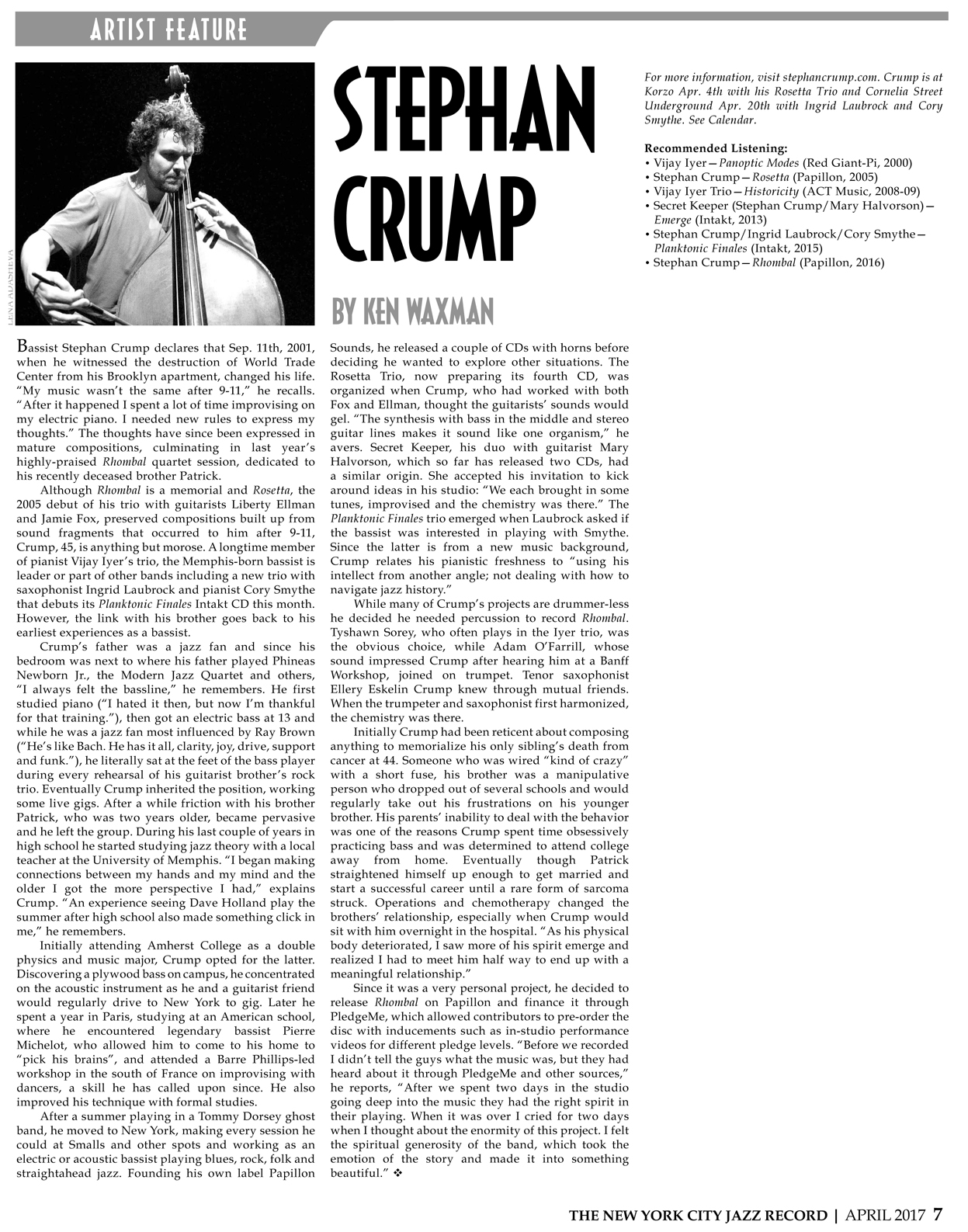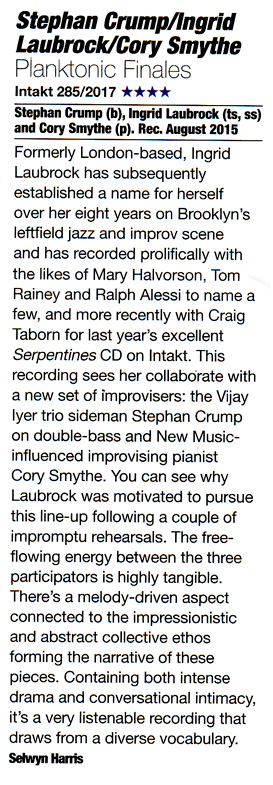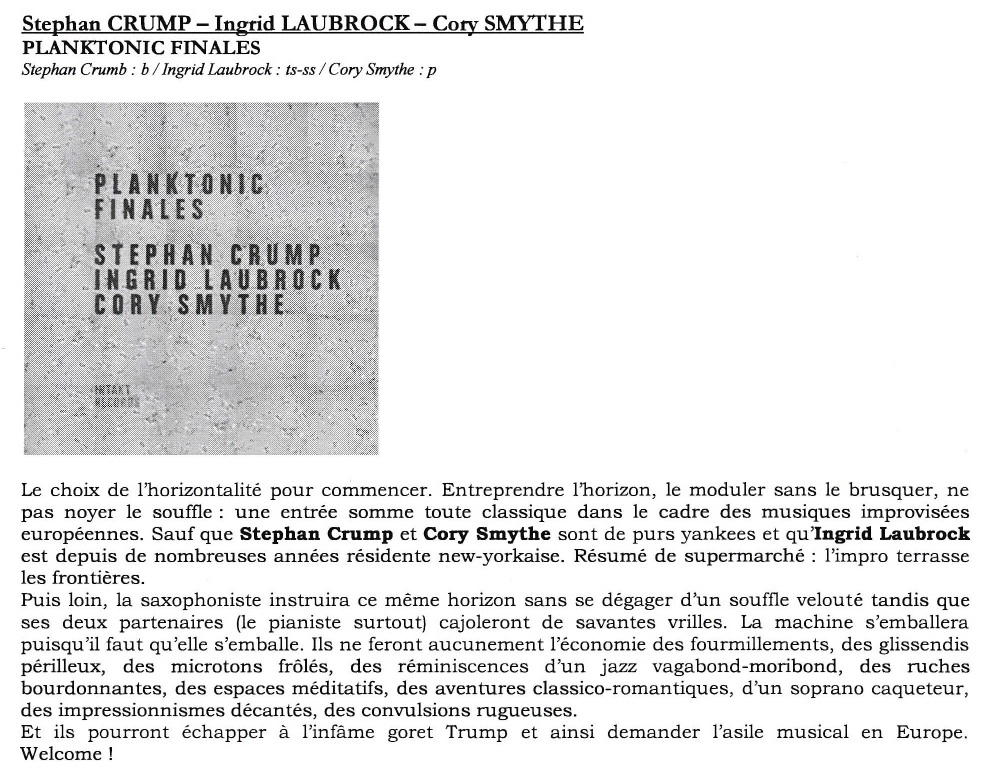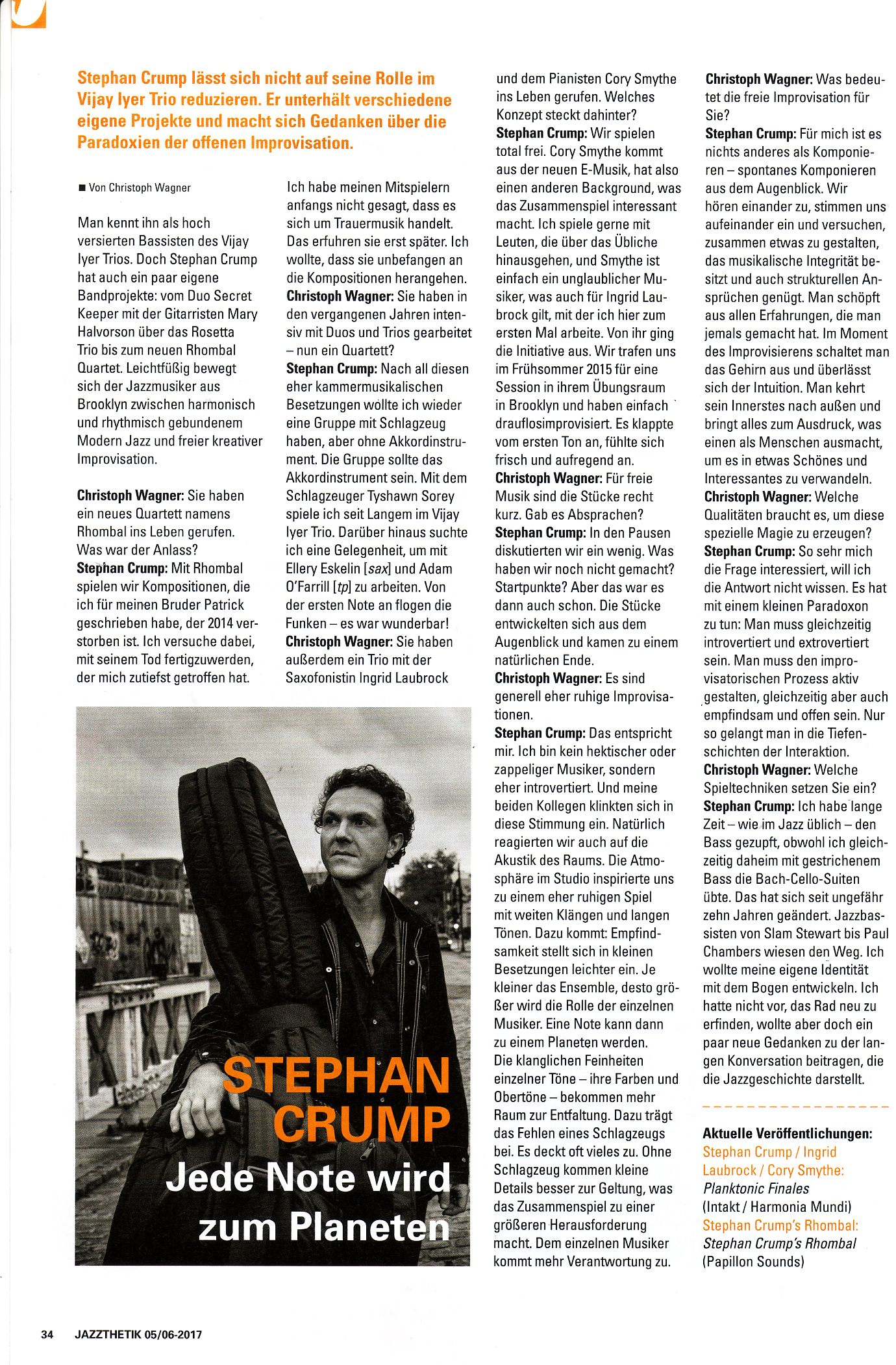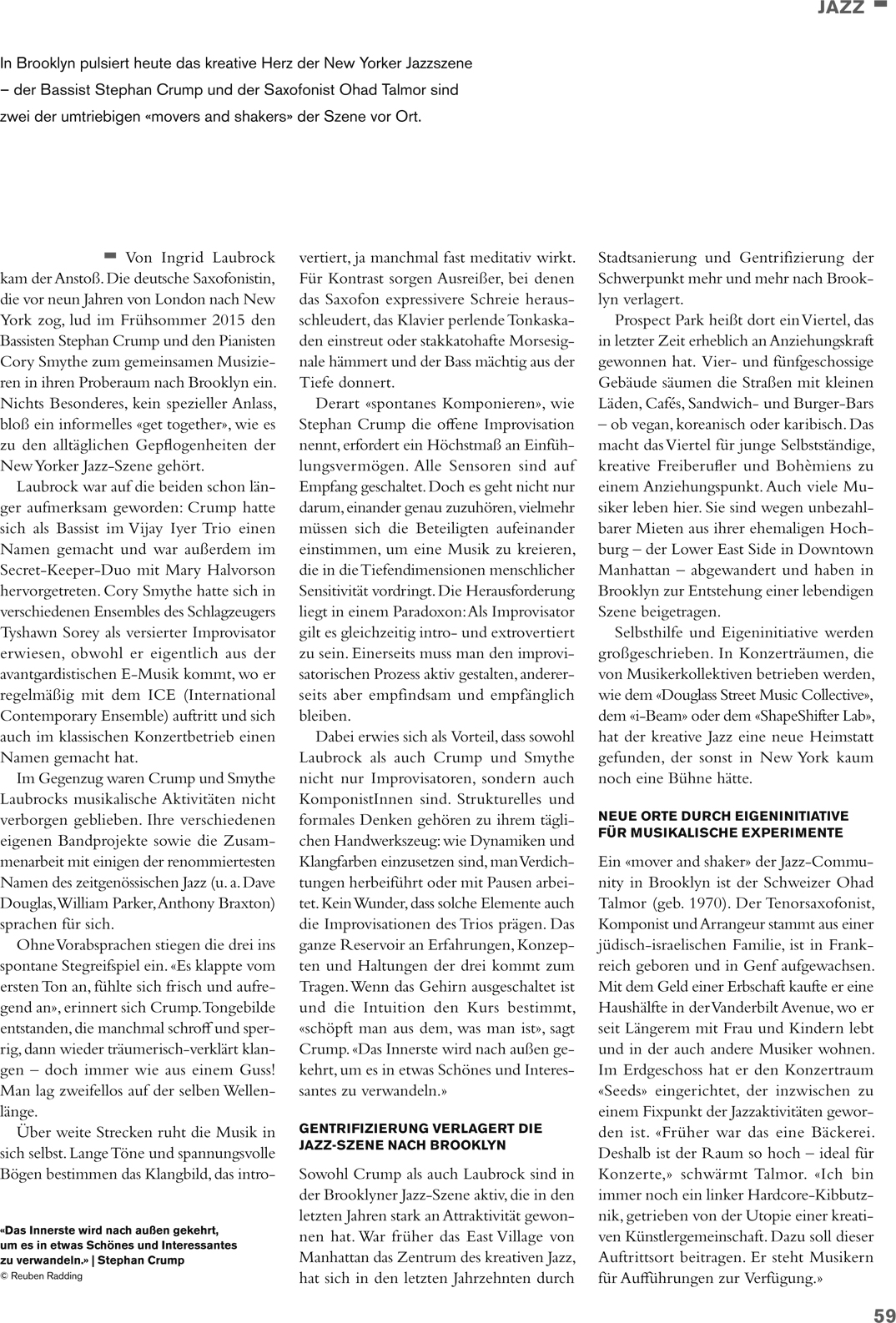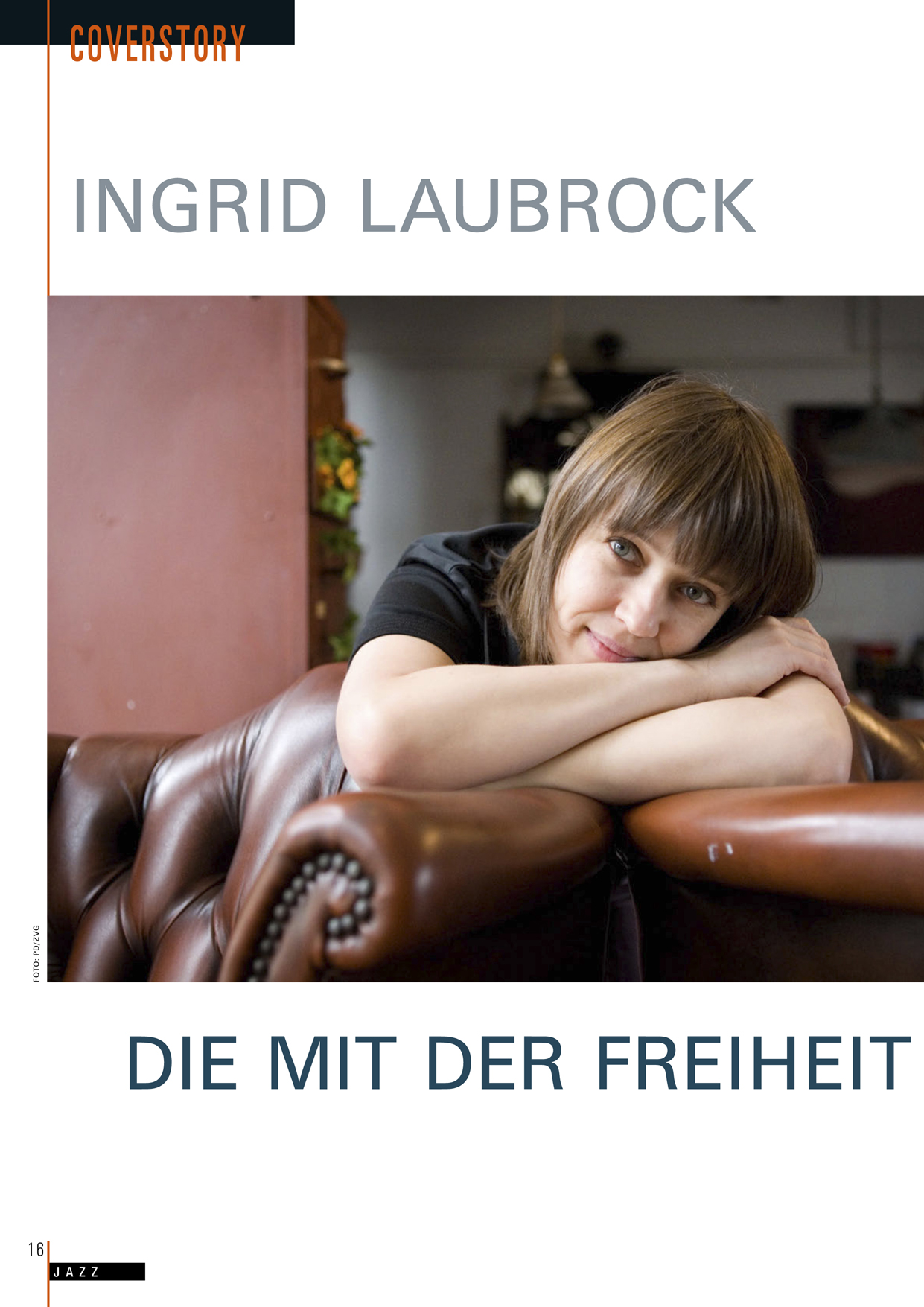INTAKT
RECORDS –
CD-REVIEWS
STEPHAN CRUMP - INGRID LAUBROCK - CORY SMYTHE
Planctonic Finals
Intakt CD 285 / 2017

Brian Zimmerman, Downbeat, February 2017
Stephan Crump, der Bassist mit französischen Wurzeln, hat mit der im deutschen Stadtlohn geborenen und heute in New York lebenden Saxophonistin Ingrid Laubrock und dem zwischen Klassik und Moderne pendelndem Pianisten Cory Smythe ein Album mit improvisierter Musik eingespielt. Nein, Songs sind das eher nicht. Hier musizieren drei gleichberechtigte Instrumentalisten. Die Dynamik ihres Miteinanders bestimmten an jenem 13. August 2015, dem Aufnahmetermin, den Fortlauf und letztendlich das Ergebnis dieser Session. "Planktonic Finales" haben sie diese gut fünfzig Minuten gelebte Freiheit genannt. "Es klappte vom ersten Ton an, fühlte sich frisch und aufregend an", erzählte Crump später. Das hat stark mit der Sensibilität der einzelnen Instrumentalisten zu tun. Alle drei sind ausgezeichnet in der Lage, spontan eigene Ideen umzusetzen und dabei dem Spiel des Mitmusikers zu folgen. So entsteht auf der Grundlage avantgardistischer Hochkultur eine spannende Kommunikation. Jeder ist Spiegel der eigenen, wie Ergänzung der Kreativität des anderen. Wandlungsfähigkeit im Ausdruck, raffiniert schattenhafte Verbindlichkeiten, minimalistische Virtuosität – es gibt auch stille Feuer die höllisch brennen.
As I began this post last night, the Grammy Awards were being handed out. Downloads of music were reportedly greater than CDs sales over the past year. That means most people listen to the music in a completely different way than they did ten or more years ago. Albums don't really matter, and forget about cover art. That went out with the 20th centure. Don't mention this to anyone in Europe, especially the jazz fans. On further thought, do tell them. I'd like to hear what their reaction is. They'd probably say we Americans don't appreciate a good thing, treating music like disposable, expendable bits of entertainment. While record labels continue to be antiquated by the general public in the states, one label in Switzerland continues to churn out albums at such a rate that even their devoted supporters (Hi!) have trouble keeping up with them. A quick look at this blog will show that I get the chance to write about a release once in a while, but there are plenty more out there. Aside from the ones I reviewed in the past twelve months, I dug the Fred Frith Trio's Another Day in Fucking Paradise (for, among other things, a great album title), the Musical Monsters disc (which unearthed a 1981 performance by Don Cherry, John Tchicai, Irene Schweizer, Leon Fancioli and Pierre Favre) and Jim Black's The Constant. Black also just released a new electric project called Malamute (look for my review in an upcoming JazzTimes). Saxophonist Ingrid Laubrock released her Serpentines project in November, followed this month by her collaboration with bassist Stephan Crump and pianist Cory Smythe, Planktonic Finales. Both discs complement each other while also showing different sides of the creative composer and improviser. Any label that will invest in an adventurous artist in that short a time period isn't going to have any regard for mass acceptance or sales anyway, just the music. Serpentines puts Laubrock's tenor and soprano (and bits of glockenspiel) in the company of Peter Evans (trumpet, piccolo trumpet), Craig Taborn (piano) and Tyshawn Sorey (drums). Rather than utilizing a bassist, Laubrock brought in Dan Peck on tuba. Also along for the adventure are Sam Pluta (electronics) and Miya Masaoka (koto), who float in and out of the five tracks. Come to think of it, most of the players do that as well. The two-part "Pothole Analytics" begins with pointillistic sounds from the horns, jutting out without really cohering just yet. Things start to gel in part two, with soprano, trumpet, tuba and piano moving in parallel lines. Even Sorey, who can fit into any setting, seems to have a written part that drives things along. As quickly as things picked up, they also die down in the final minute. "Squirrels" could have been banded into two tracks, like "Pothole Analytics" since the 15-minute piece has two distinct parts. After another rollicking soprano/piccolo trumpet conversation that appears to move from free to structured, the second half of the piece gets spare and open. Peck's tuba and Masaoka's koto create a pensive sound to which Pluta adds some electric static. Sometimes musical, sometimes noisy, it adds to sound and, at one point, makes the disc sound like it's defective. The rest of the band slowly eases in, with Laubrock casually joining the crew to close it up. The group stretches out on the other two tracks with some fine moments, though things come up a little short. "Chip in Brain" is a dark tone poem built largely on low, long tones from Peck. The combination of Taborn and Masaoko create some harplike sounds but as Evans moves from intermittent blasts to his own long tones, things never completely catch fire. The title track starts at a high level - with two minutes of free band blowing. Then things pull back to feature the piano and koto in an understated combination. It's engaging in its spareness but it doesn't end on any type of grand statement; it merely winds down. Stephan Crump (who plays with Vijay Iyer and leads his own Rosetta Trio and quartet Rhombal) has released several intimate, free improvised discs for Intakt (with Steve Lehman and in Secret Keeper with Mary Halvorson). The seeds for Planktonic Finales were sown when Laubrock invited Crump and pianist Cory Smythe to her rehearsal space to play. Smythe has a background in classical music but played on Tyshawn Sorey's two recent albums, proving his flexibility as an improviser. The natural chemistry between the players worked so well that they attempted to recreate it - or perhaps continue it - by going into the studio. In some ways, Planktonic Finales resembles Serpentines. It often moves slowly, casually, so as not to rush anything. "With Eyes Peeled" opens the album like an exposition, with each player figuring out the space between them. But more direction comes with each track, as if the whole set was originally recorded as a complete 54-minute piece and divided into 11 tracks later. When Laubrock switches to soprano on "Sinew Modulations" her languid tenor sound is likewise transformed into a plucky attack, followed by some walking bass from Crump and some Monk-like interjections from Smythe. On "Through the Forest," the piano rises and falls, abruptly dropping out at one point, which gives the music a good accent. After exploring the space methodically for awhile, the trio finally cuts loose and wails on "Bite Bright Sunlight," but in another sly maneuver, they stop just shy of two minutes, knowing there are other roads to take. Both of these albums keep the surprises coming. Some of them might not be discovered until you've made several returns to the disc. That type of approach might not be rewarded with statuettes, but as long as it keeps coming, let's consider ourselves lucky.
Stuart Broomer, New York City Jazz Record, March 2017
Florian Bissig, Jazz'n'more, Feb/März 2017
Finales still owes its existence to the impetus of saxophonist Ingrid Laubrock. A German expatriate by way of London to New York, Laubrock's traced an intriguing development in her nearly three decades in the music. Early investigations of Brazilian and Tristano School jazz led to an embrace of European free improvisation and a myriad of professional and personal connections to its American counterpart. Bassist Stephan Crump and pianist Cory Smythe straddle similar worlds; the latter originally trained on a contemporary classical curriculum before making the credible leap to improvising ensembles. Crump's done his own bit of bridging in his own folk-informed Rosetta Trio and other projects exploring Latin and R&B influences. The context here has direct and immediately discernable ties to Euro free impov with tone and texture taking on as much importance as mappable structure. Conventional melody, rhythm and harmony are peripheral considerations as the dry branch opener "With Eyes Peeled" makes abundantly clear. Crump works his bow carefully across his strings, threading a seesawing line through a fluttering, silvery mist espoused by Laubrock's aqueous patterns and Smythe's unmoored chords. "Tones for Climbing Plants" begins with extended breath channeled through tenor reed. Crump and Smythe supply a percolating counterpoint, their instruments suspended in the studio firmament in fixed proximity to Laubrock's gauzy legato shapes, which eventually take on uneasy characteristics of melody. "Sinew Modulations", the longest temporal excursion of the session, alights on another scampering, loquacious lead by Laubrock that sounds like a personalized amalgam of Evan Parker and Jimmy Giuffre. Crump and Smythe construct contrapuntal webs around her with arco and percussive strings that never impede and rather enhance her progress. A glide to collective near silence mid-piece serves as a reset with shared direction still consensually dictated in the moment and Laubrock's switch to garrulous soprano. "Three-Panel" also shows off her straight horn acrobatics in concert with Crump's bold pizzicato while "A House Alone" mimics the ambiguous ambient sounds of a vacant property in the creaks, knocks and pops of tandem strings and aerated reed. "Pulse Memory" brings to mind Free Fall-era Giuffre in the blend of chamber-geared intricacy and pastoral delicacy while "Bite Bright Sunlight" concentrates the intensity of a vintage Schlippenbach Trio blowout. That variability and mobility of means and ends proves right in tune with the attributes of the ocean-going organisms referenced in the album's title. Derek Taylor, Dusted Magazine, January 31, 2017
Narushi Hosoda 細田成嗣, Jazz Tokyo # 228, 2017
Ken Waxman, New York City Jazz Record, April 2017
Stéphan Olliver, Jazzmagazine, France, Avril 2017
Troy Dostert, The Free Jazz Collective, April 17, 2017
Saxofonistin Ingrid Laubrock hat den Anstoß zu diesem Trio gegeben, das sich ganz der Improvisation hingibt, dem spontanen Schöpfen aus dem Augenblick ohne thematische Vorgaben. Mit dem Bassisten Stephan Crump und dem Pianisten Cory Smythe hat sie idealtypische Mitstreiter gefunden. Smythe kommt eigentlich aus der avantgardistischen E-Musik und bringt das Denken in kompositorischen Strukturen mit. Zurückgenommen sind die Sounds, von einer fein pulsierenden Melancholie umhüllt. Sorgsam werden die Töne gesetzt, der Pause das ihr zustehende Recht gegeben. Verdichtungen und Crescendi sorgen zwischendurch für dramatische Höhepunkte und Spannungsbögen. Nur selten wird der konventionelle Gebrauch der Instrumente verlassen, der Bass beklopft, im Bauch des Pianos gewühlt. Das ergibt immer wieder Abwechslung und schöne Brechungen. Nichts ist lautstark oder gar polternd, aber alles schlüssig und vom guten Zuhören bestimmt. Es würde sich lohnen, mehr von dieser Formation zu hören.
Selwyn Harris, Jazzwise, 2017, Great Britain
In the process of making this spare trio a viable contemporary ensemble, bassist Stephan Crump, saxophonist Ingrid Laubrock and pianist Cory Smythe release the 2016 Intakt recording after several years of creative activity, nose-to-the-grindstone, so to speak. And a certain pungency – even a rugged lyricism – on the part of Laubrock and Smythe, with harmonies taking unpredictable directions. But it’s all par for the course for these ceaseless improvisers. The playing on this subterranean contemplation on the secret lives of the plant kingdom is sublime, operating on different, perhaps more rarefied planes considered authentic to connoisseurs of free improvisation. The intensity is real, the sounds gorgeous, the rhythms infectious throughout Planktonic Finales. Crump, Laubrock and Smythe play as if every track were a universe in itself, each musician throwing in devastating soli. Raul da Gama (from "The Intakt Adventure Continues"), jazzdagama.com, May 1, 2017
Luc Bouquet, Improjazz Nr. 234, France, 2017
Christoph Wagner, Jazzthetik, Mai 2017
Ben Taffijn, Draai om je oren, Jazz en meer - Weblog, donderdag 24 augustus 2017
Christoph Wagner, Neue Zeitschrift für Musik, 5 / 2017
Christian Rentsch, Jazznmore, Schweiz, November-Dezember 2017
Bernie Koenig, Cadence Magazine, April-May-June 2017
Troy Dostert's Best Releases of 2017, All About Jazz, December 16, 2017
Dave Cristol, Les Choc 2017, febrier 2018
To the Interview: Point of Departure, PoD62, March 2018, by Troy Collins
Tor Hammerø, Tor de Jazz, 15.04.2018
Bill Milkowski, Downbeat, August 2018 |




